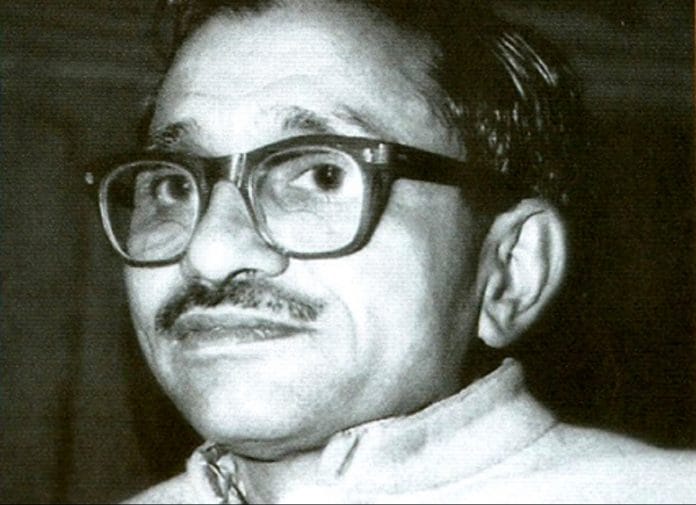The Jana Sangh ideologue’s birth anniversary has been marked by the Modi government as part of its efforts to resurrect BJP heroes.
New Delhi: Until Prime Minister Narendra Modi-led Bharatiya Janata Party (BJP) stormed to power, 25 September hardly bore any significance nationally.
However, since 2014, this day — the birth anniversary of Jana Sangha ideologue Deendayal Upadhyaya — has been celebrated by the government in various forms, including as a launch date for several programmes and initiatives.
As part of the party’s focused efforts to resurrect its heroes, whom the BJP believes have got a raw deal in the course of history under rival regimes, this day has been marked by the Modi government with great gusto ever since it assumed office.
The BJP government has also named several big schemes after Upadhyaya. During his Independence Day address this year, Modi announced that the launch of his flagship Ayushman Bharat or National Health Protection Scheme would coincide with Upadhyaya’s birth anniversary.
But why is Upadhyaya so important to the BJP? And what has the Modi government done in its four-and-a-half year tenure to revive his memory?
The ideologue
Born on 25 September, 1916, in Mathura district’s Nagla Chandrabhan village, Upadhyaya joined the Rashtriya Swayamsevak Sangh (RSS) in 1942 and remained a pracharak (full-time worker) till the very end. When the Bharatiya Jana Sangh was founded by Syama Prasad Mookerjee in 1951, Upadhyaya became part of it, going on to become its all-India general secretary, holding the post for 15 years.
Upadhyaya, who became Jana Sangh president in 1967, also edited RSS mouthpiece
Panchjanya. Electoral success, however, eluded him and he lost the Lok Sabha bypoll from Jaunpur in Uttar Pradesh in 1963.
Also read: India to showcase Deen Dayal Upadhyaya as cultural icon, to hold annual lecture
Upadhyaya’s political philosophy — ‘integral humanism’, first expounded in 1965 — went on to form core principles of the Jana Sangh, and so the BJP rejected concepts of individualism and conceived a ‘classless, casteless and conflict-free social order’.
Upadhyaya’s death, however, remains buried in mystery. In February 1968, he was found dead on a rail track near Mughalsarai railway station in Uttar Pradesh, after boarding the Sealdah Express for Patna. Recent reports suggest that the Uttar Pradesh government under chief minister Yogi Adityanath is planning to order a probe into his death.
Resurrecting Upadhyaya
The BJP has often expressed its grouse about the Congress appropriating post-Independence history and promoting only its icons.
To counter what it claims to be a one-sided narrative, the BJP has been pushing its own, with emphasis on its ideologues like Upadhyaya, Mookerjee and those from the more conservative strands of the Congress like Madan Mohan Malaviya and Sardar Patel.
Upadhyaya is pivotal to the BJP because he played a big part in both giving ideological direction and building the organisation of the Jan Sangh. While Mookherjee was the founder of the Jana Sangh, because of his premature death, the leadership for almost 15 years during the Jana Sangh’s initial phase was effectively with Upadhyaya. All the leaders the current BJP credits for its electoral growth — Atal Bihari Vajpayee and L.K. Advani — were junior to him and learnt from him.
Being a pracharak, Upadhyaya’s commitment to Hindutva remained intact till the end, and so, when the BJP owns him, it owns that part of his legacy. As BJP expands his base and tries to reach out to the poor, it seeks to leverage the symbolism of his ‘integral humanism’ thought.
Initiatives to revive legacy
The National Democratic Alliance (NDA) government has gone the extra mile to mark Upadhyaya’s legacy and as part of this blueprint, has named schemes after him and observe occasions around him with vigour across states.
The Mughalsarai railway station was renamed the Deen Dayal Upadhyaya Junction earlier this year. As part of the National Rural Livelihoods Mission, the Central government launched Deen Dayal Upadhyaya Grameen Kaushalya Yojana (DDU-GKY) to impart skill training to rural poor.
The Deen Dayal Upadhyaya Gram Jyoti Yojana aims to provide continuous power to rural India, replacing the Rajiv Gandhi Grameen Vidyutikaran Yojana. Then, there is also the Deendayal Disabled Rehabilitation Scheme.
Also read: Understanding the renaissance of Pandit Deen Dayal Upadhyaya under Narendra Modi
Not to be left behind, BJP-ruled states took their own initiatives.
Madhya Pradesh, for instance, launched the Deendayal Rasoi Yojana to provide subsidised meals at Rs 5 per meal. Rajasthan introduced the Pandit Deendayal Upadhyay Jal Kalyan Panchayat Shivir to help rural students address day to day problems. Haryana has the Deen Dayal Jan Awaas Yojana — an affordable housing scheme.
In Modi’s home state Gujarat, the Deendayal Prime Minister Jan Aushadhi Store provides generic medicines at affordable prices. Uttarakhand Chief Minister Trivendra Singh Rawat too announced his government’s growth strategy to be modelled after Upadhyaya’s ‘Antyodaya’ philosophy.
And these instances are merely the proverbial tip of the iceberg with several other initiatives, roads and other structures named after him.
In 2016, the Central government even celebrated Upadhyaya’s birth centenary on a grand scale, flagged off by the prime minister in Kerala’s Kozhikode — where he was elected president of the Jana Sangh — and concluded through a mega event in Delhi on 25 September last year, attended by over 2,000 BJP delegates.
A budget of Rs 100 crore was allotted for the centenary celebrations.







happy birthday sir
Some people will chuck stones at me for being a Left – Liberal – although we did live for a few years in Moti Bagh, which should qualify as being on the fringe of the Lutyens’ zone – but had honestly not heard of this gentleman till quite recently.